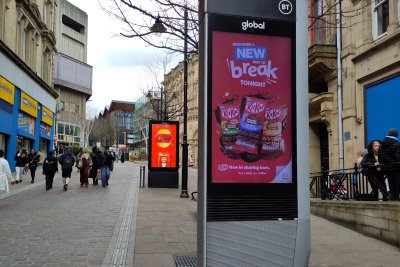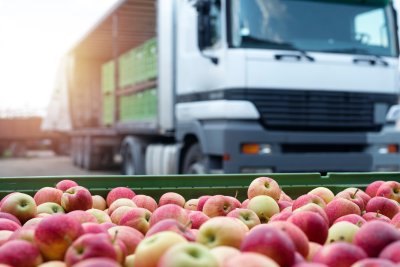 Unhealthy food advert on a bus stop in Medway. Credit: Medway Council
Unhealthy food advert on a bus stop in Medway. Credit: Medway Council
Medway Council introduces healthier food advertising policy
New policy will take unhealthy food out of the spotlight in a Council where almost one in four children aged 10-11 are living with obesity.
Medway Council has signed off on a robust policy to restrict unhealthy food and drinks adverts in their local area. The measures, developed in collaboration with Sustain, have been introduced to improve public health across the Medway Towns.
Medway Council is the sixteenth Council to introduce a robust Healthier Food Advertising Policy, after the Mayor of London, with support from Sustain, first brought in the policy across the Transport for London network in 2019.
The restrictions outlined in this policy form an important part of the upcoming Medway Food Strategy and aligns with Medway’s Food Partnership and membership of Sustainable Food Places. Medway’s vision is to create an environment that supports sustainable access to affordable healthy food and to improve knowledge about nutrition along with cooking and growing skills for all, building healthier communities and better futures for everyone in Medway.
Fran Bernhardt, Sustain's Commercial Determinants Coordinator said:
We’re delighted to have worked with Medway Council to prioritise children’s health by switching the spotlight away from unhealthy foods and drinks.
There are now 16 English Councils plus the Transport for London network which have introduced these robust policies designed by Sustain. This growing movement sends a message to the national Government to deliver on their pledges to restrict advertising on TV and online, and further focus on outdoor and radio to set the stage for healthier food across our communities.
This policy is a bold step in the right direction: prioritising not just health but equality and sustainability too. Evidence shows that putting the spotlight on unhealthy food increases the risk of food related ill health like diabetes, heart disease and tooth decay. Companies target low-income areas, resulting in people living there being more likely to experience poor health. Additionally, many of the restricted products are unsustainable containing climate damaging ingredients, such as sugar, cocoa and palm oil, as well as requiring lots of energy to process them.
We hope the terrific news from Medway will inspire even more Councils to take this important step for their residents’ health.
Cllr Teresa Murray, Deputy Leader of Medway Council, said:
I am incredibly proud of everyone involved in the dedication and innovation in achieving the Sustainable Food Award. This is a great example of a strategic and collaborative approach to good food governance and action. This recognition reflects our unwavering commitment to creating a healthier, more sustainable future here in Medway.
The changes to the Advertising and Sponsorship Policy are another big step in the right direction to help improve health and wellbeing across Medway. Eating healthier is one of the simplest steps we can take to improve our lives, and has more impact than anything else, but it can also be a difficult step to take when we’re bombarded with advertising for the wrong foods.
This policy will bolster other initiatives across Medway and help promote the food knowledge and skills to make our communities healthier and happier.
Background
Evidence from the London School of Hygiene and Tropical Medicine’s evaluation of the Transport for London policy has shown that the restrictions led to a 20% reduction in sugary products, and a 1000 calorie decrease per week per household from unhealthy foods and drinks. Further modelling research from the University of Sheffield has estimated that across London, the restriction will lead to 95,000 fewer cases of obesity, 3000 fewer cases of diabetes and 2000 fewer cases of heart disease and save the NHS £218 million over the lifetime of the current population.
Transport for London also announced that its advertising revenues have been unaffected by the restrictions since implementation in 2019. In the first year of the policy, revenues went up by £2.3 million, and in the second year (2020-21), despite financial losses due to Covid lockdowns at the time, the restrictions enabled the advertising figures to be maintained.
While local authorities are taking action, national government has stalled on anti-obesity measures. In 2020, the Government announced plans to restrict unhealthy food adverts, including a total online and 9pm TV watershed as a key part of the government's obesity strategy. These were due to be implemented in January 2023. However, in December 2022 the national Government delayed these to October 2025 - a delay that pushes them back three years after the date they originally committed to. This comes after the Obesity Health Alliance’s research found that 8 out of 10 adults support the Government restricting unhealthy food advertising to children on TV (79%) and online (81%).
If your local authority is interested in introducing a healthier food advertising policy, check out Sustain's toolkit for local authorities.
Commercial Determinants: Supporting policymakers and councils to introduce healthy food advertising policies.
Sustain
The Green House
244-254 Cambridge Heath Road
London E2 9DA
020 3559 6777
sustain@sustainweb.org
Sustain advocates food and agriculture policies and practices that enhance the health and welfare of people and animals, improve the working and living environment, promote equity and enrich society and culture.
© Sustain 2025
Registered charity (no. 1018643)
Data privacy & cookies
Icons by Icons8







